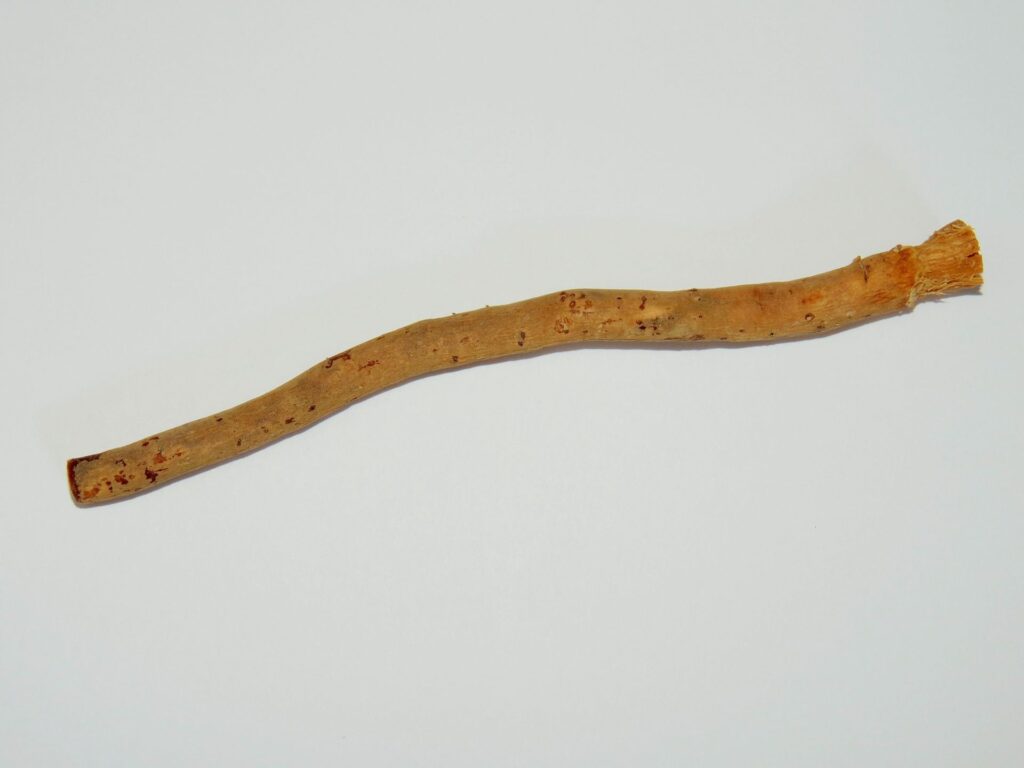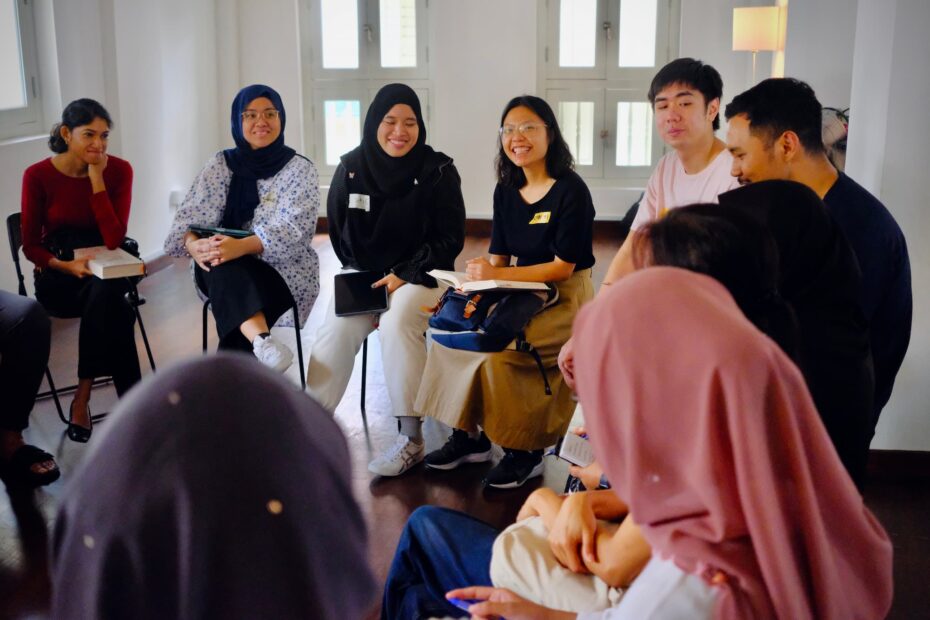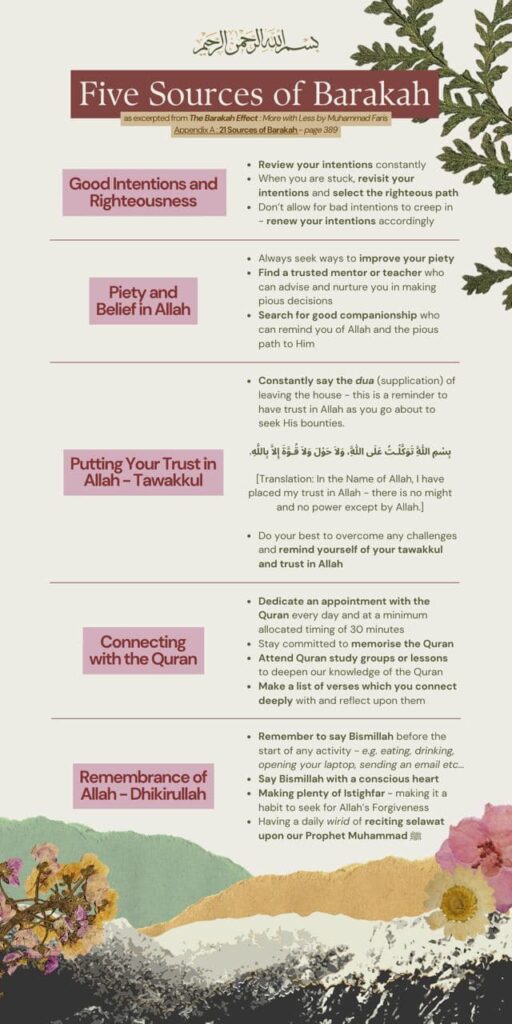Baraqah is also known as Divine Blessing, which possesses two meanings:
- Presence of goodness and its continuity.
- Abundance of goodness and its growth.
Seeking Baraqah is not about making one’s life difficult. It is about multiplying the goodness in our actions, making our lives sweeter and peaceful. Baraqah is the catalyst for the abundance of goodness in this world. A minute amount of Baraqah can bring about a myriad of blessings beyond our imagination
But why do we need to have Baraqah?
Since most societies are affluent and progressive, what is the point of having more goodness? The ‘hustle culture’ that these societies promote, is not the reality of Muslims. The hustle culture promotes never-ending pursuit toward a never-ending goal that often leads to burnout. While affluence and progress are products of such pursuit, it also give birth to an anxious, troubled heart. The concept of Baraqah is a guideline for true believers, to remain focused on the purpose of life and not be swayed by the cultural norms of our environment. Islam does not promote laziness and idleness. Islam promotes hard work and heart work. True believers are expected to invest their best effort, yet still place their trust in Allah to be the One that decides the best of outcomes.
But how should we seek Baraqah?
We begin to seek Baraqah by making Baraqah as one of our intentions.
A companion of Prophet Muhammad ﷺ, Umar ibn al-Khattab reported: The Messenger of Allah ﷺ, peace and blessings be upon him, said, “Verily, deeds are only with intentions, and every person will have only what they intended. Whoever emigrated to Allah and His Messenger, his emigration is for Allah and His Messenger. Whoever emigrated to get something in the world or to marry a woman, his emigration is for that to which he emigrated.”
— Ṣaḥīḥ al-Bukhārī 54, Ṣaḥīḥ Muslim 1907
Seeking Baraqah expands our focus and purpose beyond worldly life. It is about having a successful, meaningful worldly life that brings us even more success in the hereafter. Seeking Baraqah, makes us conscious of the reality within and around us. We are cautious of the state of our hearts. We are cautious of how we execute our actions. Are we doing things in ways that are pleasing to God?
We begin to view responsibilities in life as more than just something to fulfill. Responsibilities are a blessing, it is an opportunity to serve God. If we are concerned about fulfilling our responsibilities in our work and families, Allah Almighty will be concerned about easing our affairs. It is an opportunity to chase Allah’s contentment, alongside our pursuit in leading a successful worldly life.

However, securing a successful life in this world and the hereafter, is not a walk in the park. Take the Prophets of Allah as an example. These Prophets had an admirable mindset to begin with. Their stories in the Quran remind us that life is about nurturing and growth. If we instill the Gardener’s Mindset, we begin to acknowledge that we cannot achieve something merely by just a blink of an eye. For a plant to grow, it takes proper nurturing and conditions such as water, carbon dioxide, and sunlight. Similarly, we need proper conditions such as good well-being, a clean pure heart, and good social circles for us to grow and bloom into a slave of Allah Almighty that receives His Love and Mercy unconditionally.
With Baraqah spearheading our life trajectories, our lives will grow beyond any worldly measure because we can achieve more with less. Those who refuse to acknowledge and embed Baraqah into their lives will find their life never fulfilling and purposeful. Those who lead their lives struggling to seek Baraqah in ways that are pleasing to Allah Almighty, will find their life to be abundant and brightly lit despite having less in the darkest of days.
Let’s explore ways to infuse Barakah into our lives by examining sources that foster it. To conclude, found below are the initial five sources of Barakah accompanied with the practical actions which we can purposefully adopt in our daily routines. To explore the complete list of 21 sources, please refer to page 389 in ‘The Barakah Effect’ book, specifically Appendix A: 21 Sources of Barakah.
Stories shared about experiencing barakah
During the discussion, some participants shared their personal stories about how they experienced barakah.
Siwak and smooth Quran recitation
An attendee shared her experience of it through the practice of using the siwak (a natural toothbrush made from the twig of the arak tree read more here). She shared how whenever she goes for her Quran recitation classes, her teacher will point out many mistakes in her reading. One day she heard about the benefits of the siwak and how it is known to help you recite the Quran better when you use it before reading, so she tried it. It was the first time that she recited the Quran during her class without any mistakes.

The donation caused a big discount at an appointment
Another participant shared how she experienced it from making a donation. On her way to a medical or dental appointment, someone approached her asking for some money. Without hesitating, she gave some cash she had on her and continued to make her way to the appointment. Turns out that she had to do a relatively expensive procedure at the appointment. When it was completed and she was about to make payment, she found out that they were giving her a really big discount for no reason.
Setting up Maktaba Books with the intention to help others
One of the founders of Maktaba Books shared how they experienced barakah from setting up Maktaba Books. They started it with the intention to read more Islamic books without having to spend more on books and help others do the same. Their goal was to just have 5 more people that would be interested in this and it would be a small group of people. However, when they launched it, it became widely shared, a lot people were interested (one even dm them to be part of it). They ended up having over 400 books in the system, collaborating with Wardah Books & NLB, and now running regular book clubs with a team of passionate volunteers.
Credits for this article:
- Written by Wan Nur Zafirah
- Edited by Sitti Hatta
- Inforgraphic by Sitti Hatta

